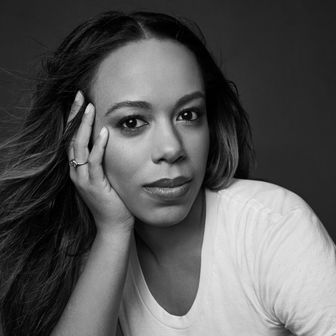
If there’s a fraternity of hairstylists who tend to women of color in Hollywood, Kim Kimble might be its president. With over 20 years of experience under her belt, Kimble has styled, cut, and coiffed the hair of Halle Berry, Mary J. Blige, Rihanna, Brandy, and, yes, Beyoncé. Along the way she developed her own hair-care brand, Kimble Beauty, which caters to women of all hair textures, but especially curly hair. I talked with Kimble about how to care for curly hair, what she thinks about the use of wigs in the entertainment industry, and her thoughts on the disparaging Atlantic piece that pigeonholed Beyoncé’s hair as stringy.
What’s your best advice for tending to curly hair?
The key is hydration. Curly hair is naturally dry because the oils can’t travel down the hair shaft. Use rich conditioning masks; curl products that are moisturizing; alcohol-free, sulfate-free shampoos; or shampoos that have mild detergents in them so they aren’t stripping the hair of its natural oil. Curls always are improved when they are hydrated. It’s better when you let your hair naturally dry, instead of using a diffuser, because it crinkles less. The less you touch it, once you put the products on, the less it starts to frizz.
There seems to be a divide on whether silicones are good or bad for hair. How do you feel about them?
I think silicones get a bad rap. I don’t think they hurt the hair, but they aren’t as nourishing, either. They just sort of sit on top, like a Band-Aid. Sometimes it can be hard to color, for example, because they coat the hair too much. But I’m not against silicones, it just depends on the kind you get.
As a hairstylist, do you believe using fake hair in hair campaigns is fair?
The reality is that everyone’s hair is not perfect. That’s why bloggers on YouTube are so popular because you can see the process. What you see in print … it’s great to have because it represents the product, but nobody’s hair is perfect.
In terms of celebrities and wigs in general, a lot of times extensions and wigs are about protecting your hair and saving you from a lot of heat and styling when you’re in the public eye every day. A lot of these women do things to change up their look because it’s a part of fashion. Everybody wears them. They’ve been around for years, it’s just a way of life. In entertainment and television, it’s what they call movie magic. It’s all about the art of styling hair, and however you can get there, that’s how you get there.
You were the artist behind Beyoncé’s most recent Vogue cover. How did the decision to give her that wet look come about?
It was collaboration between the magazine and Beyoncé’s creative team. You know, it’s something we’ve done before.
Which products did you use to create the look?
Mostly water, we kept wetting it. We also used a shine serum to create that shine. A little shine spray, too. Ultimately, we kept wetting it over time … it was like that all day.
There was an article in The Atlantic that discussed Beyoncé’s Vogue-cover hair. It sparked a bit of controversy because the writer described it as stringy.
[Laughs.] Oh, I didn’t know that. I missed all of that. I mean, it’s a look. Stringy? That’s kind of rude. It’s artistic, it’s not stringy; it’s wet hair. I think maybe she didn’t use the right choice of words, so I’ll give her the benefit of the doubt. I feel like it was a beautiful photo. I think hair is an expression. There’s no one way it should look. Everyone is going to have their own opinion, but I was very pleased with how it came out.
You work with so many dynamic women in entertainment. Have you learned anything from them on how to manage the business side of the industry?
I’ve learned a lot watching them do business, watching them grow their brand. One thing I saw was all the hard work. They have passion for what they do, and that’s how they get up every day. That’s how I feel about my job. I love hair, but it’s a hard job. It’s not easy. You have to have a passion for it because that’s what keeps you going.
There are so many hair-care lines already. What makes yours different?
I started the hair-care line because I was looking for something that worked. I saw other products that were one extreme or the other. Either they had too much alcohol or they had harsh cleansing agents that didn’t work for everybody.
I was inspired by my grandmother. She was into nutrition. She used to make these home remedies and natural concoctions, so I used to play around with them in the salon. When I created the line I wanted it to be a line that had a lot of herbal extracts and essential oils because I really like what it does to the hair. It’s paraben-free and sulfate-free.
We created a whole line around curly-haired women. I believe that it takes a system to create a look when it comes to curly hair, like a cocktail system — no curls are the same.
This interview has been edited and condensed.





